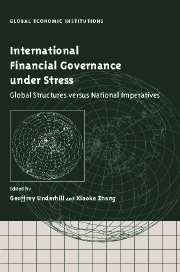Book contents
- Frontmatter
- Contents
- List of figures
- List of tables
- List of contributors
- Acknowledgements
- Introduction: global market integration, financial crises and policy imperatives
- I Financial globalisation and policy responses: concepts and arguments
- II Globalisation, financial crises and national experiences
- 5 Crisis consequences: lessons from Thailand
- 6 The politics of financial reform: recapitalising Indonesia's banks
- 7 South Korea and the Asian crisis: the impact of the democratic deficit and OECD accession
- 8 Currency crises in Russia and other transition economies
- 9 Capital account convertibility and the national interest: has India got it right?
- 10 Learning to live without the Plan: financial reform in China
- 11 The Asian financial crisis and Japanese policy reactions
- III Private interests, private–public interactions and financial policy
- IV Building the new financial architecture: norms, institutions and governance
- Conclusion: towards the good governance of the international financial system
- Index
5 - Crisis consequences: lessons from Thailand
Published online by Cambridge University Press: 22 September 2009
- Frontmatter
- Contents
- List of figures
- List of tables
- List of contributors
- Acknowledgements
- Introduction: global market integration, financial crises and policy imperatives
- I Financial globalisation and policy responses: concepts and arguments
- II Globalisation, financial crises and national experiences
- 5 Crisis consequences: lessons from Thailand
- 6 The politics of financial reform: recapitalising Indonesia's banks
- 7 South Korea and the Asian crisis: the impact of the democratic deficit and OECD accession
- 8 Currency crises in Russia and other transition economies
- 9 Capital account convertibility and the national interest: has India got it right?
- 10 Learning to live without the Plan: financial reform in China
- 11 The Asian financial crisis and Japanese policy reactions
- III Private interests, private–public interactions and financial policy
- IV Building the new financial architecture: norms, institutions and governance
- Conclusion: towards the good governance of the international financial system
- Index
Summary
The failure to manage the Asian crisis, to understand the mistakes and to institute reforms with any meaning for crisis-vulnerable countries, restates the importance of local, national and regional responses to financial globalisation.
The crisis which began when Thailand floated its currency on 2 July 1997 became a regional crisis and then a global crisis. The focus of subsequent analysis has, quite rightly, been on the international implications of the event. Thailand became a side-show in a much larger global drama. Yet the course of the crisis in the affected countries contains important lessons. Developing countries whose GDPs represent a minute fraction of the world economy are especially vulnerable to financial volatility. The discussion of reform in the international financial system petered out in 1999 once the crisis was contained in eastern Europe and Latin America. Proposals that the international financial institutions should have a duty to control volatility had already been struck off the agenda before this time. While the dangers of capital account liberalisation without appropriate monetary and regulatory policies are now well understood and thus unlikely to be repeated, the underlying vulnerability to volatility remains.
The lessons from the Thai case are obscured because early interpretations of the Thai crisis were highly ideological, and because the IMF has been intent on claiming credit for successful crisis management. In 1999, Michel Camdessus, the then Managing Director of the IMF, announced that Thailand has ‘graduated from the IMF University summa cum laude … graduation means victory … the job is done’.
- Type
- Chapter
- Information
- International Financial Governance under StressGlobal Structures versus National Imperatives, pp. 101 - 118Publisher: Cambridge University PressPrint publication year: 2003



